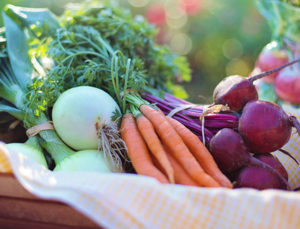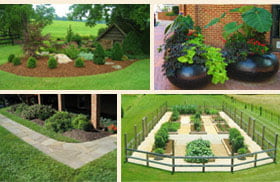
Winter Ready
As temperatures and leaves begin to fall, it may seem like the gardening season is over, but there are still plenty of things to do to prepare for the next season. Prepare for another successful growing season and plant your winter garden with these tips!
Clean Up
Leftover plants can harbor disease and create a place for the eggs of unwanted insects to incubate. The roots of these plants can actually help the soil, but you will want to remove the stems and vegetation above the surface and dispose of them properly. If plants are disease free, you can bury them in garden trenches to add organic matter to your soil and improve your overall soil health.
This is also an excellent time to remove and eliminate unwanted weeds that may threaten to overtake your garden patch. Invasive weeds can be removed completely from moist autumn soil to prevent them from sprouting even more vigorously in the spring. Be sure to destroy roots completely if you choose to add removed weeds to your compost because many weeds can remind viable in compost and come back as part of next year’s crop.
Prepare for Spring
It is common for gardeners to wait until spring to amend soil and improve soil quality, but fall can be just as beneficial if not more so when it comes to preparing next year’s vegetable bed. Dig into your soil and add compost, manure, bone meal, kelp, and rock phosphate. The freeze and thaw of fall and winter help to break down these nutrients and enrich your soil, making it biologically active. Fall tilling can also improve drainage and minimize the effects of extreme weather. In addition to these benefits, you also gain the advantage when the busy spring planting season begins by having much of your preparation done in advance.
Once you have made any soil amendments, cover your garden beds with plastic sheeting to prevent your soil from washing away or draining your amendments away below the active rooting zone. This is especially important for raised beds that drain readily. The sheeting can be removed in early spring, leaving the soil ready to be planted with just a light tilling.
Keep it Covered
 Planting a cover crop not only allows you to continue to enjoy gardening through the winter, but it can also be helpful in maintaining beneficial organisms, bacteria, and creatures like earthworms to keep your soil in fine form and prevent the loss of nutrients. Leaving your soil completely bare will starve these helpful occupants and inhibit the success of next year’s crop.
Planting a cover crop not only allows you to continue to enjoy gardening through the winter, but it can also be helpful in maintaining beneficial organisms, bacteria, and creatures like earthworms to keep your soil in fine form and prevent the loss of nutrients. Leaving your soil completely bare will starve these helpful occupants and inhibit the success of next year’s crop.
Plants like field peas and beans do more than simply cover the soil, adding powerful soil-nurturing benefits, including a significant source of nitrogen and roughage for soil structure. Add about ½”-1” of manure or compost to your soil to encourage plants to germinate early in the fall, and watch them as they grow. You want to cut back your peas and beans before they flower to get the most benefits from your cover crop.
There are also several plants that do well and even provide a harvest during winter. Depending on your climate, many of the following will be successful during the winter months:
- Spinach
- Lettuces
- Arugula
- Asian Greens
- Chard
- Kale
- Mâche
- Parsley
- Carrots
- Turnips
- Leeks
- Radish
Winter gardening can be very rewarding, with very little need for weeding or watering. Add compost when planting your winter garden, and feel free to continue to augment your compost on warm, wet days throughout the winter to help boost your plants and your soil.
Divide and Conquer
 Fall is the ideal time to prune perennials and divide bulbs. Prune herbs and vegetables like fennel, rosemary, thyme, asparagus and rhubarb, and trim shrubs and blackberry canes to help control spread and prevent crossing canes. Raspberry canes should be left standing, as they continue to nourish the crown of the plant into winter.
Fall is the ideal time to prune perennials and divide bulbs. Prune herbs and vegetables like fennel, rosemary, thyme, asparagus and rhubarb, and trim shrubs and blackberry canes to help control spread and prevent crossing canes. Raspberry canes should be left standing, as they continue to nourish the crown of the plant into winter.
If you dug up bulbs earlier in the season, this is the time to replant them. If you have bulbs that are still in the soil, dig up the bulbs, separate them and spread them evenly throughout your garden for lush, vigorous results the following spring.
Remove and Refresh
Now is the time to remove old, spent mulch and compost and renew them for winter. Your summer compost is likely spent and ready to be removed. You can use leftover compost to fertilize lawns and landscaped beds and jump start spring growth.
Adding mulch for the winter season protects the soil from erosion and helps prevent weeds from taking hold the following spring. Mulch also helps the soil stay warm and transition into the colder months, protecting the roots of your garden plants and shrubs. The mulch adds fresh organic material to your soil as it breaks down over the winter, super charging beds and landscaping for the coming spring.
A little planning and care now can not only keep your garden neat and tidy through the winter, but can significantly boost your results in the coming year!
